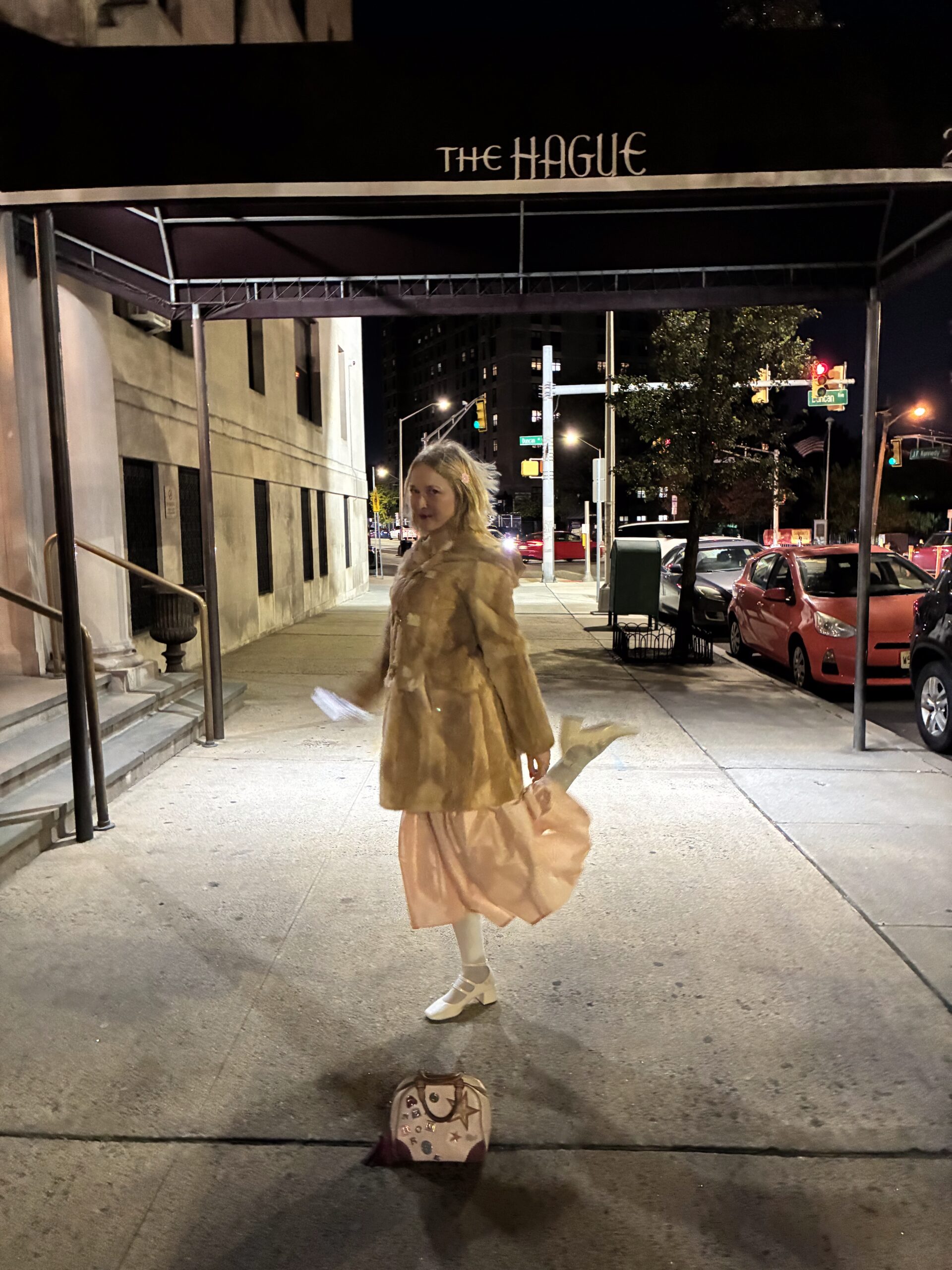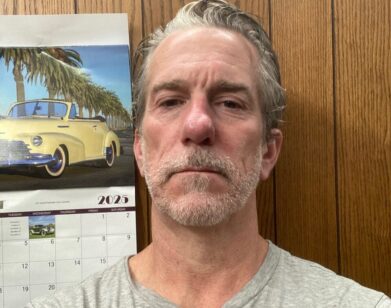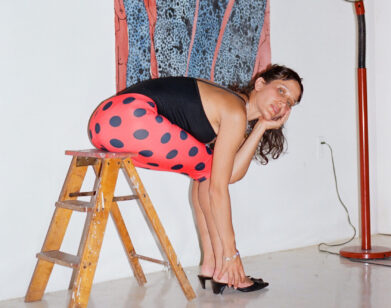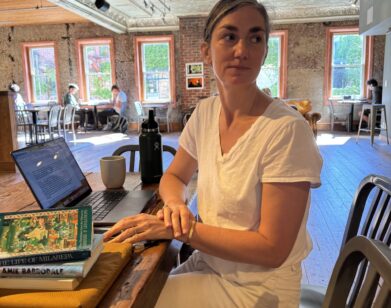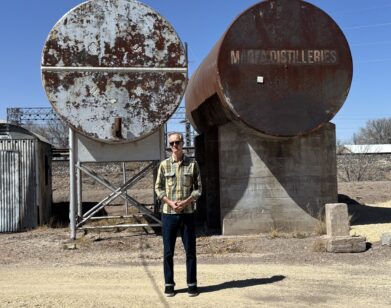IN CONVERSATION
Frauds, Frenemies, and Flat Earthers: Inside Anika Jade Levy’s Debut Novel
Anika Jade Levy, the downtown writer and founding editor of Forever Magazine, describes Avery, the narrator of her debut novel Flat Earth, as a “non-entity.” Avery is a writing student, ostensibly working on a collection of cultural reports on fringe and conspiracy groups in rural America as she shadows her best friend Frances on a documentary shoot of the same material. Frances drops out of school, leaves New York, and Avery is left to continue her project alone, going to art openings and parties in the city, eventually landing a job at a right-wing dating app. Each chapter of the novel begins with one of these reports, which act as eerie impressions of the collective unconscious as experienced through Avery, who, much like a conspiracy theorist, often mistakes her own myopic worldview as universal truth. Avery might be a non-entity, but what she observes and how she observes it says a lot about her—both as a sort of cultural canary and as a young woman with a habit of projecting. In Avery’s view, for example, no one looks at art for its own sake; instead, they compose themselves next to art in order to be viewed as someone who is looking at art. Friendship is indistinguishable from rivalry, connection indistinguishable from insult, and conviction indistinguishable from fad (her self-described conservatism mostly involves putting beef lard on her face and roasting a chicken). I met with Levy for coffee last month to talk about Flat Earth, and she told me her book was not right-wing, “but it is coming from a very accelerant environment.” We talked more about that environment, writing with someone specific in mind, muddled American world views, and the lure of right-wing novelty in the inter-Trump years.
———
HALLE BUTLER: I’m thinking about this thing of making work in New York where you’re trying to focus on the work itself, but then there’s this ever-present machine that you also feel like you have to navigate, so you can never really be alone with the work.
ANIKA JADE LEVY: I think the best and the worst thing about my book is that I was completely incapable of being alone with it. I was basically imagining a specific rotating set of male readers in every single moment. And I feel like every single page, I’m like, “Do you like me? Do you like me? Sorry, I won’t take up too much of your time. Sorry, I’ll be more pyrotechnical.”
BUTLER: Pyrotechnical in the language or in her self-destruction or—
LEVY: I just feel really not entitled to a reader’s time at all. I don’t know if you read this piece in Vulture recently about male fiction writers. But they were basically making the case that it’s screen novels, and this new cohort is catering to a kind of reader who has a phone within a foot of them at all times. And I kind of feel like if you’re not aware of that as you’re writing, and that’s not a concern you have, then you’re not interested in mass literacy continuing as a project.
BUTLER: Interesting. I mean, when I’m writing, I guess I’m thinking about the state of literacy a bit, but I’m not necessarily thinking about winning over an audience that I disagree with on some fundamental level.
LEVY: Do you not write to be loved?
BUTLER: I think the first time I wrote to prove something, and then the second time I just wrote because I was depressed. And then the third time I did it because there was something I wanted to figure out. But I think the experience of reading has inherent value, so I’m more writing out of that. And then just the pleasure of shaping it. And this is maybe an old-fashioned attitude, but I’m writing for like, 4 or 5 people.
LEVY: But I actually think it’s really essential to have a specific person in mind. I had just started corresponding with Sheila Heti when I started this book. And she was, for a time, reading it chapter by chapter, page by page. And thank god I had some kind of female gaze when I was writing this, or I don’t know what it would have been like. It would have just been all Avery getting initials carved into her the whole book or something. But I think the pleasure and the possibility of being read by the writers who have formed you is kind of all we have left.
BUTLER: Yeah. A lot of times those writers are dead.
LEVY: Yeah, they’re dead. Tracing concerns and obsessions and styles and modes that reassert themselves over time is really exciting to me. I’m in the process of writing an introduction to a reissue of Barry Hannah’s book, The Tennis Handsome. One thing I’ve been thinking about with his work is that, like, my writing is so informed by contemporary female writers working in fragments. I remember when everyone was reading Department of Speculation they were like, “Oh, moms have to write in fragments because they only have 15 minutes at a time. It’s actually feminist.” Then seeing this kind of masculine fragmentation, and realizing sometimes Barry Hannah had to write fragments because he’s fucking wasted. I think in so many ways, form and style asserts itself as a reaction to the culture’s deficiencies. Or to the writer’s deficiencies.
BUTLER: What do you think the culture’s deficiencies are that your writing is working either against or with?
LEVY: I think basically attention and also self-obsession.
BUTLER: Right, totally.
LEVY: The highest form of art in this moment is like, do I see myself or not? And even when we’re looking at the internet, we’re not looking at it to look at our friends. We’re looking at it as a mirror. We’re looking for ourselves.
BUTLER: Can you talk about the front quote?
LEVY: Of course. The epigraph?
BUTLER: Yeah. “All the things for me are lawful.”
LEVY: Yeah. So I think for me, it was sort of a formal manifesto, when I wanted to write it in this crazy way. So that was part of it.
BUTLER: It’s stylistic.
LEVY: Yeah, it was like a stylistic manifesto.
BUTLER: That’s not the whole quote, right?
LEVY: Yeah. The quote is “All things are lawful, but not all things are useful,” I think. Or helpful.
BUTLER: Helpful, or not all things are edifying.
LEVY: Yeah.
BUTLER: I’m curious about this, and your decision to put a period in the middle of it. It’s like you can do whatever you want, but—
LEVY: Yeah.
BUTLER: Is this really what you want to do? And that was sort of how I was encountering Avery. I was thinking about her moral stance in terms of this quote, too.
LEVY: Avery is really interested in being two-dimensional, because that’s the only way she’s capable of moving through the world. A lot of it was about my own inability to write a nuanced female character, but also just her feeling that she is so often an object and she’s interested in being an object and feeling like an object.
BUTLER: Because she’s a masochist.
LEVY: She’s a masochist. And the other thing is, I guess I’ll give it away, but she fucks her best friend’s husband at the end of the book. And it’s like mimetic desire. She’s not capable of wanting anything she hasn’t seen before, but it’s also this weird way of trying to feel close to her best friend, because the real love story in the book is between Avery and Frances. And this is her way of feeling close to Frances.
BUTLER: Avery wants to look out into the world and see herself, but she also wants to take other people into herself and understand herself through other people.
LEVY: The experience I was having when I was writing was just this intense feeling of porosity, feeling like every experience I was having was really, really penetrating me. I’ve been thinking a lot about how armoring yourself as a woman is this rite of passage, and so much of what we consider to be youthful or naive or stupid is associated with a kind of softness or porosity or lack of armor. And the book is really about Avery’s refusal to armor herself against anything.
BUTLER: Can you talk to me more about Avery’s worldview?
LEVY: Yeah, it’s incoherent.
BUTLER: It is a bit.
LEVY: I think to be American right now, basically all of our politics is completely incoherent. The definition of Americanness is incoherence. And I think the thing that I was responding to was this realization that so many of what I thought were my own insights were completely limited to basically a cultural and political pendulum.
BUTLER: Right. I’m fascinated by this. I feel like I’m always annoyed when people on the left start to resemble the people I grew up with on the right, liberals against free speech or something like that. But I’m equally frustrated by this reaction to that, which is like female artists for Christian patriarchy.
LEVY: Yeah. “We actually need less women in museums.”
BUTLER: Yeah.
LEVY: Right. I mean, it was also embarrassing to have, at least in that moment, any kind of political conviction whatsoever. So I think I was writing out of a place of intense political disillusionment where it’s like, novelty is the only thing. Novelty is all there is.
BUTLER: That’s interesting. You were feeling politically disillusioned and interested only in novelty. Did your feelings clarify over the course?
LEVY: I exorcised it a little bit by writing the book and by dating a bunch of delusional Marxists because, you know… But so much of what I was seeing downtown in that period, 2021, 2022, was this intense infusion of tech and crypto money downtown. It was this kind of exciting moment because parties were getting really good again. But then you would be like, “Oh, why is that guy measuring his friend’s skull? And why is this Indian national talking to me about race?” That was a lot of what I was observing at parties. And it does feel a bit like it was just a think tank for the whole country.
BUTLER: What’s odd to me about it is the difference between that and what I used to think of as downtown New York art parties, where you wouldn’t have someone doing eugenic phrenology type stuff.
LEVY: But I mean, I guess there’s just no way to be transgressive anymore.
BUTLER: Yeah. I mean, I’m frustrated by this idea of total devotion to transgression for its own sake, where you could lose your humanity just to be in on a trend or get attention.
LEVY: Yeah. And I think also, if you say something long enough as a joke, it will become true. And I think that’s happened a lot.
BUTLER: It’s like dark fake-it-till-you-make-it.
LEVY: Yeah. I am happy that my own politics have kind of clarified, but I was just completely mystified by what I was seeing around me. I think in a lot of ways, the Biden years did feel very David Cronenberg, like, you know, the president is having three facelifts a month and is so clearly not at the helm. I don’t know if you saw this clip of Trump where a reporter said, like, “Oh, you said recently you’re worried you’re not getting into heaven.” And he said, “Well, I was being a little bit cute. But yeah, I don’t think I’m going to heaven. Maybe this is heaven now, me on Air Force One.” And it’s like, it’s extremely charming and, like, cool what he says.
BUTLER: Interesting.
LEVY: It’s like, is there just a way to say that this evil tyrant who is putting people into concentration camps has charisma?
BUTLER: It’s interesting because when he was running in the Bernie-Hillary-Trump election, I was like, “Oh yeah. Hillary seems so stiff and so awkward and so unlikable. Bernie was the clear choice. But Trump was funny.”
LEVY: He had charisma and you weren’t allowed to say that.
BUTLER: Yeah, but I don’t think it’s funny anymore.
LEVY: Yeah, I don’t think the political situation is funny whatsoever. But then he has these moments of candor.
BUTLER: But he’s, like, psychotic.
LEVY: Yeah.
BUTLER: What he says is something you would want to watch on a video online, and I do think that people kind of wanted him to win again because they were bored. I find that upsetting.
LEVY: Well, people were bored, but I know for my own very specific cohort it was hard to hold your nose and vote for Harris after she said that her policy on Palestine would be no different from Biden’s. And Trump is so wildly unpredictable that I remember having moments of being like, “Oh, maybe he will get something done, in this one particular way.”
BUTLER: But it seems like flat earther shit to see Trump as the peace candidate.
LEVY: Well, that’s what the title of the book refers to. Downtown, these people are just as delusional and as out of touch. And frankly, more responsible. But the situation I’m responding to is that it feels like the right, in some ways, is capable of producing novelty or the illusion of novelty. And the left is completely lost. I hope that there’s a way out of that. This writer Gideon Jacobs has written a couple of really interesting pieces for the Los Angeles Review of Books. The first one was responding to the initial assassination attempt against Trump, which was so cinematically perfect. Basically he was saying that in a world with more cameras than people, the nature of reality is shifting and becoming more cinematic, and Trump won because he was a better producer of images than Kamala. And we’re all sick from these images. And he was saying the only memorable image that Kamala has ever produced is the still from the video where she’s saying, “We did it, Joe.” And I’m like, “Oh, that is kind of her only iconic image.” Whereas, I don’t know if you’ve looked on Instagram. It’s so horrifying. They’re posting these AI modded videos of immigrants being rounded up to like, “Summertime Sadness” by Lana Del Rey.
BUTLER: I mean, yeah, I think that makes a case against novelty.
LEVY: Yeah. But, like, how do we make a better image? Or how do we divest from images?
BUTLER: I don’t think you need to divest from images. I mean, there’s nothing inherently wrong with images. It’s a phone thing, right? I think there’s something about looking at a tiny glowing box at desensitizing images for hours a day that does something really damaging to your brain.
LEVY: Yeah. And it’s like the novelty on violence has been completely removed. I’ve been rereading all of the Barry Hannah books and I don’t think he ever went to war, but he wrote about Korea a lot. You can tell he thinks violence is beautiful and good. And I think you can’t be that well-acquainted with violence to really believe something like that. But I think we need a new way of saying things that we don’t mean, right? Or a new kind of matrix for humor that’s not totally destructive.
BUTLER: Contradiction does open up sort of a third option. I mean, that’s something that art is supposed to do, right? Art is supposed to round out politics because it’s not coming from a rational place, exactly. It’s kind of spontaneous. It’s from the unconscious. It’s nutty in a way that maybe Trump is nutty, but you’re doing it within the confines of art or literature.
LEVY: I’m worried about the book I wrote. It’s not right-wing, but it is coming from a very accelerant environment.
BUTLER: Well, it has a familiarity with that mindset, but I think it would be difficult to read this book and think of it as an endorsement of that mindset, because it’s so miserable.
LEVY: I guess the danger is that you cannot become literate in anything without that thing penetrating you a little bit. So I don’t know. My next book will be different and hopefully a little bit more nuanced and complicated, but the main thing about this book is that I wrote the only good book I knew how to write.
BUTLER: I think this book is complicated.
LEVY: Thank you.

